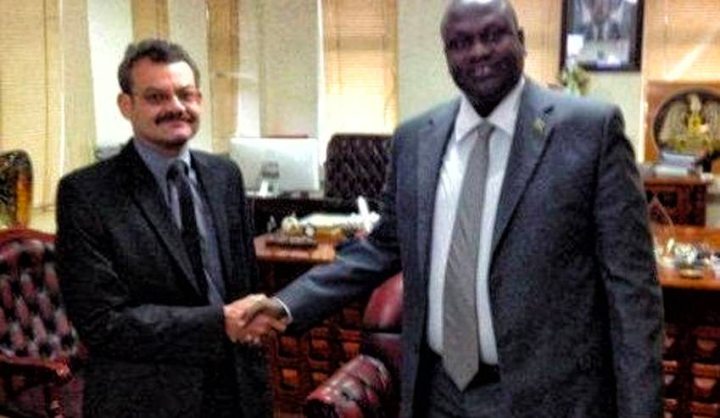Africa Relations
South Sudan pardons condemned SA man to boost confidence in peace process

Ex-SANDF colonel William Endley is due home soon.
South Sudanese President Salva Kiir pardoned former South African military officer William Endley to build confidence in the country’s new peace process, his government explained.
But analysts believe it’s going to take a lot more than such symbolic gestures to preserve this peace where similar previous ones have failed.
“President Kiir did it to show his commitment to peace and his commitment to the opposition,” said Peter Bior, spokesman for South Sudan’s embassy in Pretoria said about the pardon of Endley.
“It was a confidence-building measure.”
Kiir announced his pardon of Endley during celebrations in the capital Juba on Wednesday to mark the launch of yet another peace process. Endley was due to be released on Thursday and to return to South Africa “in due course”, Pretoria said.
Endley, an ex-South African National Defence Force colonel, was serving as a military adviser to Kiir’s old foe Riek Machar and was captured by Kiir’s forces in 2016 after the breakdown of the last peace deal between Kiir and Machar.
On 12 February a South Sudanese court sentenced him to death for espionage and conspiring to overthrow the government.
Kiir’s decision to pardon and release him this week was related to Machar’s return to Juba to take up his old position of deputy president, under the latest peace deal between him and Kiir signed on 12 September.
Machar had been deputy president since South Sudan won independence from Sudan on 9 July 2011. But in 2013 he and Kiir had a massive fallout, sparking a bloody civil war.
In August 2015 they signed a peace deal but in July 2016 after Machar had returned to Juba to take up his old position of deputy president under the new deal, they had another fallout and Machar fled the country for his life.
Endley stayed behind and was taken into custody by Kiir’s forces.
The South African Government has welcomed Kiir’s pardon of Endley, “as a gesture of peace”.
“We appeal to all South Africans who happen to get opportunities to work abroad to observe and respect the laws of the countries they serve,” said Lindiwe Sisulu, Minister of International Relations and Co-operation.
“We extend our gratitude to President Kiir to release one of our own to once again spend time with his family,” said Sisulu.
“The National Peace Celebration is an important milestone towards rebuilding trust and committing to finding lasting peace and stability in South Sudan,” the statement added.
Bior defended the death sentence passed on Endley in February, saying he had been appointed as a major general in the army of a rebel (Machar) and therefore had tried to overthrow a foreign state.
If a South Sudanese had done that in South Africa, he should also have expected “to face the consequences”. He noted that South Africa also had a law preventing its citizens providing military services in foreign states.
“But it’s a peace moment and we are in peace mode,” he said and pardoning Endley was part of a wide range of gestures being made by Kiir to advance the peace process.
However many analysts are sceptical about the prospects of this peace deal between the bitter enemies, given the failure of previous attempts.
The outgoing UN special envoy for Sudan and South Sudan, Nicholas Haysom told Daily Maverick just after the 12 September peace deal was signed that several conditions still had to be met if it was to succeed.
The deal would have to become more inclusive, several gaps in the security arrangements – especially around cantonment of fighters and merging them into one army – would have to be plugged; the huge plunder of public funds would have to be addressed before donors pumped in more funds; and the peace deal would have to be made more enforceable.
The August 2015 peace deal had broken down because the government, particularly, took the steps it wanted without any outside party insisting that it stuck to the agreement.
“And the question which South Sudanese are asking, is what’s going to be different this time? Given the history of two previous agreements.
“And this is what I have warned, that the IGAD leadership, the leadership of the region has to take a much tougher and stronger, even intrusive role, in enforcing the agreement.”
However Haysom added that one encouraging change favouring the current peace deal was the recent improvement in the regional environment. “Right across the Horn of Africa region, peace has broken out…”, he says. This has largely been prompted by new Ethiopian Prime Minister Abiy Ahmed’s rapprochement with his country’s old enemy and neighbour, Eritrea.
Haysom said this reconciliation had had knock-on effects beyond these two countries. “People have now begun to engage with parties in regard to their interstate conflicts which we had been told were intractable until Abiy came along; such as Djibouti-Eritrea, Ethiopia-Eritrea; Somalia and its neighbours.” DM

















 Become an Insider
Become an Insider